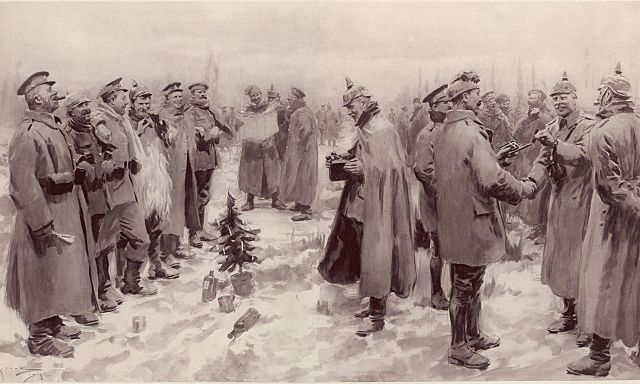Start on common ground
How do we find common ground?
Is it even worth trying?
These days, the most prevalent answers to these questions seem to be:
Who the hell knows?
Probably not.
The political scene in the United States in 2017 looks more like the battlefields of World War I circa 1917: Two sides dug in firmly. Neither of them willing to give an inch; neither of them gaining any ground.
Yeah, that last sentence concludes with a bit of wishful thinking. I don’t count Mitch McConnell out as of any fight, but I certainly hope the GOP doesn’t gain any ground with their deadly “healthcare” bill.
And that—right there—that’s the problem. It seems like the best I can hope for is stasis, paralysis. Is this any way to run a country?
So how do we find common ground?
The answer—well, one answer—came from an unexpected place this morning, as I was preparing to lead my advanced writing class. I re-read a passage from Seth Godin’s book All Marketers (Are Liars) Tell Stories in which he outlines the qualities great stories have in common. The final quality in the list:
Great stories “agree with our worldview. The best stories don’t teach people anything new. Instead, the best stories agree with what the audience already believes and makes the members of the audience feel smart and secure when reminded how right they were in the first place.”
That explains the entrenchment, right? The Republican side listens to Fox News and that awful, racist website whose name I can’t bear to repeat and parrots their talking points (see last week’s post about Ana Marie Cox interviewing people at a Trump campaign rally in Iowa). The Democratic side listens to Rachel Maddow and reads The New York Times. The same New York Times that our president has branded as “failing.”
Having a self-appointed media critic as president only heightens the divisions. As he succeeds in sowing distrust of media outlets (“fake news CNN”), his supporters become even less likely to accept any objective reporting they may stumble across. How can we reach them with the truth?
Maybe we need to start with their worldview. Instead of fighting it, slip into it for a moment. Not all of it—of course, some of the president’s supporters have reprehensible views—but the worldview of the average person on the street. Or, in my case, behind the counter at the dry cleaner.
The Dry Cleaner & the Humpback Whales
A couple of weeks ago, I went to retrieve a jacket from the dry cleaner’s. The lady working the counter was listening to a talk radio show host rant about womyn’s studies—”spelled with a Y”—and dying humpback whales. The bit about the whales featured mournful background music, like one of those movies where the teenager finds true love just as the deadly disease claims her life. It was way over the top.
And I got offended. I felt disrespected. I mean, listen to whatever you want on your own time, but when you’re working in a public-facing role in a business, don’t make your customers listen to it too. After all, some of those customers might care about endangered species. Or be “womyn.” Okay, back in the late ’70s I too mocked “womyn”—but that’s not my point. Or maybe it is.
Common ground—there’s common ground, if we just care to look for it. Now, I wouldn’t have engaged the dry cleaner’s salesclerk in a discussion of male privilege and language. But I could have said something more constructive than what I did say—basically, that I thought they did great work but I wouldn’t be coming back because of “that crap you’re listening to.” Nope, no common ground there.
Opportunity Lost
As soon as I got back to the car I realized I’d missed an opportunity. I could have found something we’d both agree on. After all, the Congressional Budget Office had just published its score of the Senate’s healthcare bill. Millions of people would become uninsured, and those of us with insurance would face drastically rising premiums and drastically reduced coverage.
I wish I’d talked to her about healthcare. Maybe said something like, “Why are they talking about humpback whales on your radio show when the Senate is ready to vote on a healthcare bill that will affect everyone in the country?”
Or that’s probably even too partisan-sounding. Common ground: “Man, there sure is a lot that needs fixing in this country. Do you think whales are really the most important thing to talk about? I’m worried about my healthcare. How about you?”
Maybe I’d open her mind a little, get her to think for herself. Maybe the next time I saw her, we could find a little more common ground. That’s how cultural change happens. In one-on-one interactions, millions of them. Every single day.

Literal common ground. An artist’s reconstruction of the Christmas Truce by A. C. Michael – The Guardian [2] / [3]Originally published in The Illustrated London News, January 9, 1915., PD-US
Time for a “Christmas Truce”
One Christmas Day in the middle of World War I, opposing soldiers stepped out of their trenches and rediscovered their common humanity. No fighting, just eating. Some drinking. Singing. An improvised game of soccer. Small gifts.
One British soldier, Murdoch M. Wood, speaking in 1930, said: “I then came to the conclusion that I have held very firmly ever since, that if we had been left to ourselves there would never have been another shot fired.”
Can we take it upon ourselves to stop the verbal assaults? Stop the mudslinging? The politicians won’t stop on their own. The media won’t stop either; even the more objective outlets cover politics like it’s a blood sport.
But we can stop, individually.
Let’s fight the politicians with every argument we can muster. But when we talk to each other, let’s choose to look for common ground. It’s pretty much literally the least we can do.